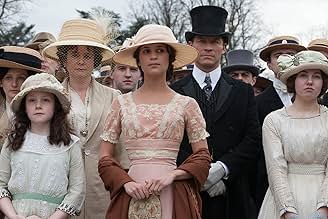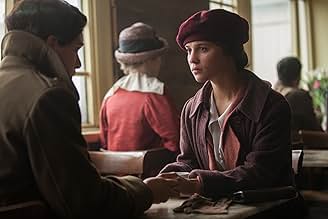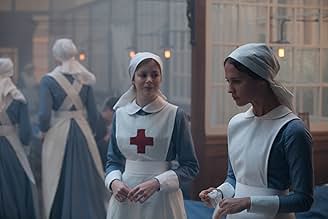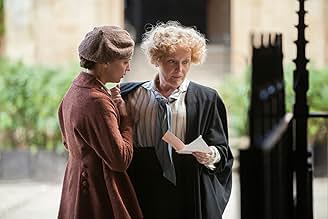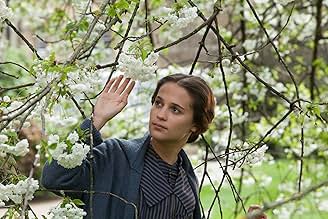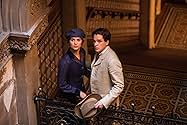Eine Britin erinnert sich an die Volljährigkeit während des Ersten Weltkriegs - eine Geschichte über junge Liebe, die Sinnlosigkeit des Krieges und wie man die dunkelsten Zeiten verstehen ka... Alles lesenEine Britin erinnert sich an die Volljährigkeit während des Ersten Weltkriegs - eine Geschichte über junge Liebe, die Sinnlosigkeit des Krieges und wie man die dunkelsten Zeiten verstehen kann.Eine Britin erinnert sich an die Volljährigkeit während des Ersten Weltkriegs - eine Geschichte über junge Liebe, die Sinnlosigkeit des Krieges und wie man die dunkelsten Zeiten verstehen kann.
- Regie
- Drehbuch
- Hauptbesetzung
- Auszeichnungen
- 5 Gewinne & 7 Nominierungen insgesamt
Empfohlene Bewertungen
One of the things that determines Testament of Youth different to other bloody, explosive and bullet-ridden war tales is that it is focused on the domestic view of the ones who not only joined the war on the front-line, but also those at home and the consequent effects on loved ones, offering an unseen perspective, and solid-account of the despair that war causes.
Beginning in pre-war 1914, we are introduced to Vera Brittain, a determined and wilful individual with aspirations of not becoming just a traditional young-married women, but one who attends Oxford University and chooses her own life-choices.
Along with her brother Edward (Taron Egerton) and his two friends Victor (Colin Morgan) and Geoffrey (Jonathan Bailey), they all enjoy their youth in the rural village with their parents (Dominic West and Emily Fox). On-the-road to Oxford, she is introduced to her brothers close friend Roland (Kit Harington), and a relationship soon breaks out - but untimely, as does the war.
Quite proud to do so out of loyalty to Queen and country, her brother Edward, and friends Victor and Geoffrey with Roland all sign up to the forces to assist. (Against parental wishes to do so). Now at Oxford, yet unable to focus as this devastation is happening all around her, she joins the forces too, as a nurse - and the film develops from there.
Given a world-premiere at the 58th BFI London Film Festival, the film is squeezed out in time for the Remembrance holidays and by-all accounts award season. Based on our criticism alone, it is going to be praised and remembered at both.
Crafted by former TV-movie director, James Kent, along with the (brilliant) cast, Testament of Youth is a thoroughly engaging history drama in Downton Abbey-esqe war times and a unique approach to the war like never before.
The camera may seem to dwell too much on idyllic country scenes and beautiful vistas at the expense of plot and character, though that does help to heighten the contrast between Vera's privileged but restricted prewar life and the new life of purpose and endless horror that awaits her at a field hospital in France. The camera's used most effectively when the two worlds collide-to illustrate Roland's poem addressed to the corpse of a German soldier found lying in a patch of wildflowers, most of all in the panorama of a boundless field of dead and dying men surrounding the hospital after a "big push" (which echoes the famous crane shot after the Battle of Atlanta in "Gone with the Wind"). I'll let the nitpickers figure out if the Leightons' house on the South Coast really did have a magnificent view of what looks like the White Cliffs of Dover, but the stormy shoreline makes the perfect backdrop for a scene in which Roland returns angry and shellshocked from the front
The basic storyline-Vera's service in France and her romance with Roland Leighton-is skillfully dramatized and very moving; her struggle with the conventions of Georgian family life is somewhat less involving, one exception being an ironic episode in which she's summoned back from the front to deal with a family "crisis," only to find that her mother's gotten sick and has fallen behind with the housework
The much-praised '79 series with Cheryl Campbell only seems to be available on VHS and Region 2 DVD; I wouldn't hesitate in recommending this gorgeous and affecting new version as an alternative.
The film opens with a maffick, but with one young woman being rather subdued, even dazed. Then in a clever scene, there is a Col. Blimp- style swimming scene.
We are introduced to Vera Brittain, living in provincial comfort in Buxton Derbyshire, and struggling against social convention. She and her young male friends, all on the threshold of adulthood, are looking to the future. It is the summer of 1914 and the era is caught well and authentically.
Love is in the air and as our story develops we get some nice Michael Corleone-style 'Sicilian' courting. In a small part, Joanne Scanlan plays the chaperon Aunt Belle. She delivers to the part the same depth that she did when playing Mrs Catherine Dickens in last year's 'The Invisible Woman'. Played initially for laughs, the chaperon takes a much deeper and more human role as Summer moves into Autumn. There is a station scene, much more dramatic than that in the recent 'The Imitation Game', because the trains are going in a different direction.
Vera Brittain herself wrote of critics who doubted the authenticity of her account. Who are we, to measure the authenticity and depth of feeling of young lovers? This was their love, not ours! The reality of WWI, of course, can be easily measured and recounted.
The film gets progressively darker as the war intrudes into the story. The darkest scenes of all are set in France. These scenes are grim and gritty, muddy and bloody. There are many poignant scenes of love and war. Vera Brittain's male companions are played well by a strong cast. The central character of Roland Leighton is well played by Kit Harington, Here however, his romantic side is much more subdued, than that in his role in last year's 'Pompeii', where he featured in what was arguably the most romantic kiss scene of all time. Appropriately, Colin Morgan who has previously played the role of Merlin, here adds some magic, in what is perhaps the most poignant scene in this film. Perhaps the most sinister-looking figure in the film, is the innocent-faced-looking telegram-boy, played by Xavier Atkins. A small but scary part.
Pre-war Imperial Britain changed to the post-war era of Vera Brittain. The pre-war campaign for votes for women failed. The war forced women to do jobs previously done by men, to take up new roles and new responsibilities. Thus the post-war clamour for women's equality could no longer be ignored, and instead change started. The life and literature of Vera Brittain was an inspiration for the next generation, not the least being her daughter, the politician Shirley Williams. Vera Brittain's 'Testament' is now a recognized part of British culture and history. It is a long time since I read her book, but it seems to me that this film authentically captures the story in the book.
WWI was a seminal event. It changed the lives of a generation. it was a dominant theme in thinking in the inter-war period. To understand positions taken before and during WWII, we need to understand the context in which these positions were adopted.
In four short years British history was changed forever. So too for the world. This true story authentically captures the period and the resultant changes. 9/10.
It has a slow period-piece start. It's got a nice hazy moody feel. Vikander is great but the guys need more exposition. They don't have enough space to show their characters. It's a slow burn and it's all concentrated on Vikander. She wins me over slowly. She has great sadness. It has very poignant moments especially in the later parts.
Wusstest du schon
- WissenswertesSaoirse Ronan was originally cast as Vera Brittain but she dropped out due to scheduling conflicts. Alicia Vikander replaced her.
- PatzerAs Roland and Vera meet in late 1914 before he leaves for France, Aunt Belle notices that Roland is sick and she talks about how influenza is ripping through the troops and it's in all the newspapers "Spanish Influenza they call it." The earliest known case of what would only later be called the Spanish flu was in March of 1918--and reports of the plague were zealously suppressed in the press of the belligerent nations for fear that it damaged morale. The only reason the disease, which actually was first documented in Kansas, was named "Spanish Flu", was because Spain was neutral in the war and the Spanish papers were free to report cases, giving the wrong impression elsewhere that Spain was hit first and harder by the disease.
- Zitate
Roland Leighton: Down the long white road we walked together. Down between the grey hills and the heather. You seemed all brown and soft, just like linnet. Your errant hair had shadowed sunbeams in it. And there shone all April in your eyes.
- Crazy CreditsDuring the opening credits, World War I guns can be heard in the background.
- VerbindungenFeatured in Film '72: Folge #44.1 (2015)
- SoundtracksSilver Threads Among the Gold
Written by H.P. Danks & Eben E. Rexford
Performed by John McCormack
Source: Library and Archives
Canada/Silver Threads Among the Gold
1922/AMICUS 31399658
Top-Auswahl
- How long is Testament of Youth?Powered by Alexa
Details
- Erscheinungsdatum
- Herkunftsländer
- Offizielle Standorte
- Sprachen
- Auch bekannt als
- Спогади про майбутнє
- Drehorte
- Produktionsfirmen
- Weitere beteiligte Unternehmen bei IMDbPro anzeigen
Box Office
- Bruttoertrag in den USA und Kanada
- 1.822.250 $
- Eröffnungswochenende in den USA und in Kanada
- 53.000 $
- 7. Juni 2015
- Weltweiter Bruttoertrag
- 5.851.758 $
- Laufzeit
- 2 Std. 9 Min.(129 min)
- Farbe
- Sound-Mix
- Seitenverhältnis
- 2.39 : 1







